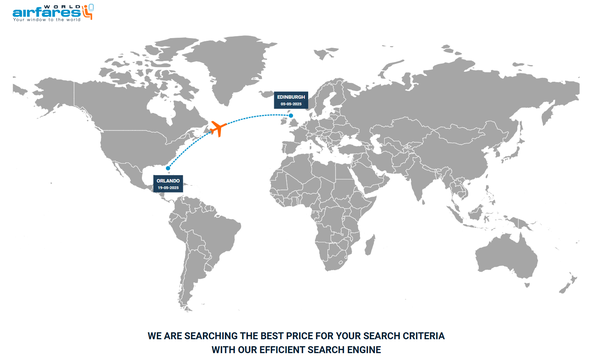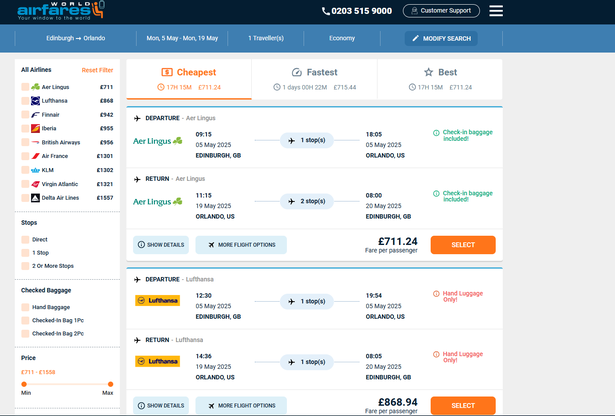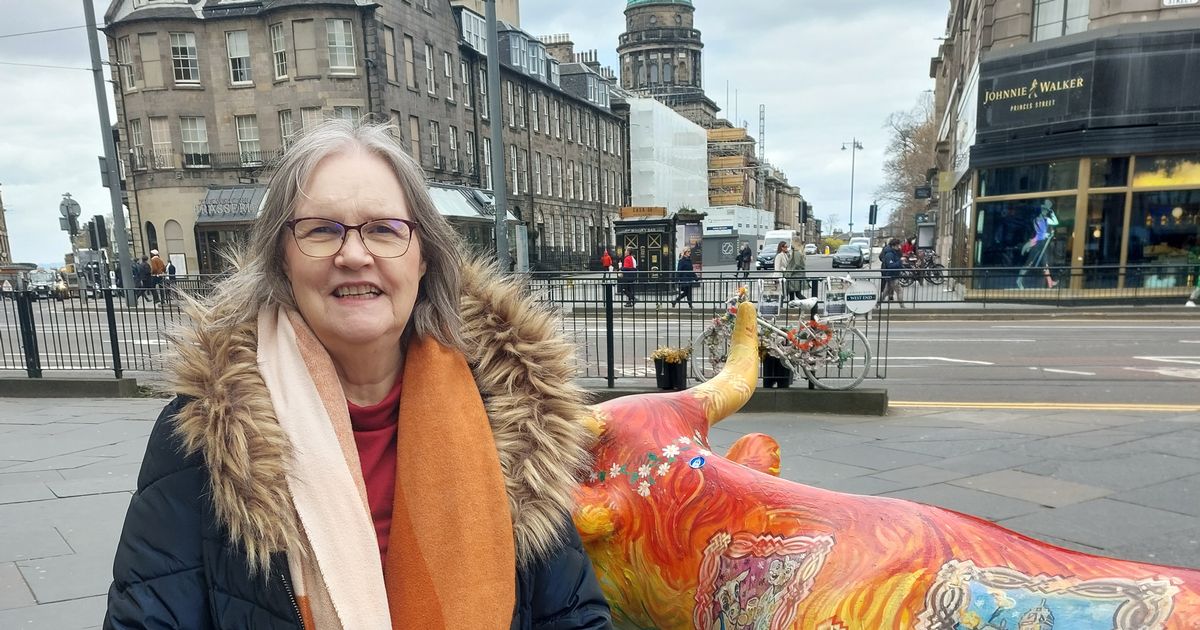Christine Shaw, 75, from Edinburgh, forked out £660 for open-return flights to Orlando from Edinburgh last month. Christine Shaw forked out nearly £700 for the flights to Florida(Image: Supplied)
Christine Shaw forked out nearly £700 for the flights to Florida(Image: Supplied)
A disabled OAP was left devastated after her she was targeted by heartless scammers on a fake flight ticket site.
Christine Shaw, 75, from Edinburgh, forked out £660 for open-return flights to Orlando from Edinburgh last month. But when the retired nurse turned up at Edinburgh Airport, United Airlines had no record of her ticket and she was unable to board the plane.
Her son Paul, 50, had to use his credit card to pay for a new, more expensive ticket – costing £2,200 – so his mum could fulfil her holiday dream. He is now struggling to pay off the debt while also trying to recover the money his mother lost.
 Paul’s mum saved up for the dream trip(Image: Supplied)
Paul’s mum saved up for the dream trip(Image: Supplied)
Paul says his mum, who suffers from heart, liver and kidney problems, was scammed after searching flights from Scotland to the US on Google.
The pensioner put her money down on a fake site cloning renowned travel agent World Airfares.
She handed over the cash without being in the company of Paul, who said he would have spotted the red flags after it stated she wouldn’t need a ESTA to visit America.
 The illicit site posed as World Airfares.
The illicit site posed as World Airfares.
Speaking to the Record, Paul said: “My mum was devastated. She had saved up for so long to go to Florida, it was her dream trip. When we arrived at the airport, they had no record of her name. They desperately tried to search for it but it wasn’t there.
“As time went on, it was becoming more and more apparent she was scammed. She was so upset. In the end, I put her ticket on my credit card. I couldn’t bear to see her so upset over it all.”
Paul has now urged others to be aware of online holiday scams as he slammed fraudsters for cruelly conning his elderly mum.
He urged holidaymakers to make sure they verify any website by checking the site address and making sure it is registered with a reputable trade body like ABTA or ATOL.
 Paul has urged others to be aware of online holiday scams
Paul has urged others to be aware of online holiday scams
Other ways to check sites are genuine is by making sure there haven’t been any alterations to the travel company’s domain name.
Additionally, checking for reviews on reputable sites like Trustpilot or TripAdvisor can help to gauge the legitimacy of the travel company.
 Paul Shaw(Image: Supplied)
Paul Shaw(Image: Supplied)
Paul said: “It’s disgusting that these sites can get away with targeting the vulnerable and elderly. Had I been in her company when she bought the tickets, I would have seen the red flags straight away.
“Their email didn’t match the name of the website and they were telling her she didn’t need a visa. Obviously, as an elder, she isn’t as clued up on digital dangers as we are.
“I’d hate for this to happen to anybody else so I’d urge any holidaymakers to make sure the website is authentic by checking it is registered with a trade body. I’d also encourage people to double-check domain names for any spelling errors.
“Checking reviews can also ensure you are buying from a reputable organisation.”
Tips for customers to avoid scam travel sites
1. Double-check the URL — customers should verify that they are booking with official websites. Fraudulent websites may use subtle spelling changes or additional characters.2. Be cautious with paid Google ads — scammers may bid on brand names. Scroll down to the organic (non-sponsored) results.3. Call before booking, travel agents will be happy to confirm any details. 4. Watch for unrealistic pricing — if it seems too good to be true, it usually is.5. Poor website formatting – blurry logos, missing images, broken internal links, or strange layouts are red flags. Some fake sites copy a homepage but leave inner pages unfinished.6. Check the contact email – reputable agents will use official company email domains. Be cautious if a “travel agent” uses Gmail, Yahoo, or other free email services.
A spokesperson for Wold Airfares said: “We’re very sorry to hear about Ms. Shaw’s experience and extend our sympathy to her and her family. Whilst we do not know the exact details of this case, we do believe that this was carried out by fraudulent third parties impersonating trusted travel brands, including World Airfares, often through misleading Google ads.
“We are actively reporting these fraudsters to ABTA, ATOL (regulatory bodies that we are members of), Police Action Fraud, and Google to remove fake listings. As ABTA and ATOL-protected members, we urge customers to only book with verified travel agencies, and to cross-check any travel company’s credentials directly with ABTA (abta.com) and ATOL (via the CAA website) before making a booking.”
Paul is now fundraising to recover the money lost. Donate to his online fundraiser here.
